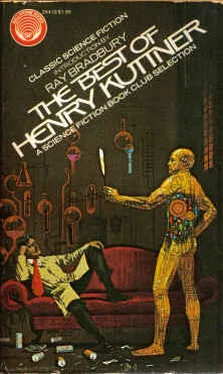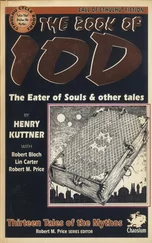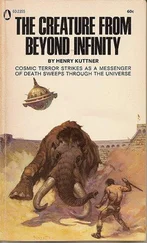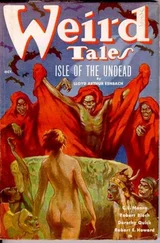“No, I won’t do that. But be sure to wear them whenever you go out.”
“Don’t worry about that. And-I’ll mail you a check. It may take me a few days to scrape up the dough, but I’ll do it. How much?”
“Five hundred dollars.”
“I’ll mail a check today.”
“I prefer not to accept a fee until the client has been satisfied,” Talley said. He had grown more reserved, his blue eyes cool and withdrawn.
“Suit yourself,” Carmichael said. “I’m going out and celebrate. You-don’t drink?”
“I can’t leave the shop.”
“Well, goodbye. And thanks again. I won’t be any trouble to you, you know. I promise that!” He turned away.
Looking after him, Talley smiled a wry, unhappy smile. He did not answer Carmichael’s goodbye.
Not then.
When the door had closed behind him, Talley turned to the back of his shop and went through the door where the scanner was.
The lapse of ten years can cover a multitude of changes. A man with the possibility of tremendous power almost within his grasp can alter, in that time, from a man who will not reach for it to a man who will-and moral values be damned.
The change did not come quickly to Carmichael. It speaks well for his integrity that it took ten years to work such an alteration in all he had been taught. On the day he first went into Talley’s shop there was little evil in him. But the temptation grew stronger week by week, visit by visit. Talley, for reasons of his own, was content to sit idly by, waiting for customers, smothering the inconceivable potentialities of his machine under a blanket of trivial functions. But Carmichael was not content.
It took him ten years to reach the day, but the day came at last.
Talley sat in the inner room, his back to the door. He was slumped low in an ancient rocker, facing the machine. It had changed little in the space of a decade. It still covered most of two walls, and the eyepiece of its scanner glittered under amber fluorescents.
Carmichael looked covetously at the eyepiece. It was window and doorway to a power beyond any man’s dreams. Wealth beyond imagining lay just within that tiny opening. The rights over the life and death of every man alive. And nothing between that fabulous future and himself except the man who sat looking at the machine.
Talley did not seem to hear the careful footsteps or the creak of the door behind him. He did not stir as Carmichael lifted the gun slowly. One might think that he never guessed what was coming, or why, or from whom, as Carmichael shot him through the head.
Talley sighed and shivered a little, and twisted the scanner dial. It was not the first time that the eyepiece had shown him his own lifeless body, glimpsed down some vista of probability, but he never saw the slumping of that familiar figure without feeling a breath of indescribable coolness blow backwards upon him out of the future.
He straightened from the eyepiece and sat back in his chair, looking thoughtfully at a pair of rough-soled shoes lying beside him on a table. He sat quietly for a while, his eyes upon the shoes, his mind following Carmichael down the street and into the evening, and the morrow, and on toward that coming crisis which would depend on his secure footing on a subway platform as a train thundered by the place where Carmichael would be standing one day next week.
Talley had sent his messenger boy out this time for two pairs of shoes. He had hesitated long, an hour ago, between the rough-soled pair and the smooth. For Talley was a humane man, and there were many times when his job was distasteful to him. But in the end, this time, it had been the smooth-soled pair he had wrapped for Carmichael.
Now he sighed and bent to the scanner again, twisting the dial to bring into view a scene he had watched before.
Carmichael, standing on a crowded subway platform, glittering with oily wetness from some overflow. Carmichael, in the slick-soled shoes Talley had chosen for him. A commotion in the crowd, a surge toward the platform edge. Carmichael’s feet slipping frantically as the train roared by.
“Goodbye, Mr. Carmichael,” Talley murmured. It was the farewell he had not spoken when Carmichael left the shop. He spoke it regretfully, and the regret was for the Carmichael of today, who did not yet deserve that end. He was not now a melodramatic villain whose death one could watch unmoved. But the Tim Carmichael of today had atonement to make for the Carmichael of ten years ahead, and the payment must be exacted.
It is not a good thing to have the power of life and death over one’s fellow humans. Peter Talley knew it was not a good thing-but the power had been put into his hands. He had not sought it. It seemed to him that the machine had grown almost by accident to its tremendous completion under his trained fingers and trained mind.
At first it had puzzled him. How ought such a device to be used? What dangers, what terrible potentialities, lay in that Eye that could see through the veil of tomorrow? His was the responsibility, and it had weighed heavily upon him until the answer came. And after he knew the answer-well, the weight was heavier still. For Talley was a mild man.
He could not have told anyone the real reason why he was a shopkeeper. Satisfaction, he had said to Carmichael. And sometiI~ies, indeed, there was deep satisfaction. But at other times-at times like this-there was only dismay and humility. Especially humility.
We have what you need. Only Talley knew that message was not for the individuals who came to his shop. The pronoun was plural, not singular. It was a message for the world-the world whose future was being carefully, lovingly reshaped under Peter Talley’s guidance.
The main line of the future was not easy to alter. The future is a pyramid shaping slowly, brick by brick, and brick by brick Talley had to change it. There were some men who were necessary-men who would create and build-men who should be saved.
Talley gave them what they needed.
But inevitably there were others whose ends were evil. Talley gave them, too, what the world needed-death.
Peter Talley had not asked for this terrible power. But the key had been put in his hands, and he dared not delegate such authority as this to any other man alive. Sometimes he made mistakes.
He had felt a little surer since the simile of the key had occurred to him. The key to the future. A key that had been laid in his hands.
Remembering that, he leaned back in his chair and reached for an old and well-worn book. It fell open easily at a familiar passage. Peter Talley’s lips moved as he read the passage once again, in his room behind the shop on Park Avenue.
“And I say also unto thee, that thou art Peter…. And I will give unto thee the keys of the Kingdom of Heaven…
At dusk Joel Locke came home from the university where he held the chair of psychonamics. He came quietly into the house, by a side door, and stood listening, a tall, tight-lipped man of forty with a faintly sardonic mouth and cool gray eyes. He could hear the precipitron humming. That meant that Abigail Schuler, the housekeeper, was busy with her duties. Locke smiled slightly and turned toward a panel in the wall that opened at his approach.
The small elevator took him noiselessly upstairs.
There, he moved with curious stealth. He went directly to a door at the end of the hall and paused before it, his head bent, his eyes unfocused. He heard nothing. Presently he opened the door and stepped into the room.
Instantly the feeling of unsureness jolted back, freezing him where he stood. He made no sign, though his mouth tightened. He forced himself to remain quiet as he glanced around.
It could have been the room of a normal twenty-year-olçl, not a boy of eight. Tennis racquets were heaped in a disorderly fashion against a pile of book records. The thiaminizer was turned on, and Locke automatically clicked the switch over. Abruptly he turned. The televisor screen was blank, yet he could have sworn that eyes had been watching him from it.
Читать дальше







